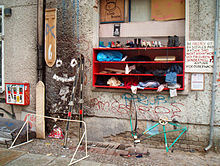- Gratis
-
For other uses, see Gratis (disambiguation).
Gratis is the process of providing goods or services without compensation. It is often referred to in English as "free of charge" (FOC) or "complimentary". Companies, producers, and service providers often provide certain things free of charge as part of a larger business model or pricing strategy.
Contents
Etymology
The English term gratis has its origins in late Middle English; from Latin. A contraction of gratiis, meaning 'as a kindness', which in turn stems from the root gratia meaning 'grace' or 'kindness'.[1] It is widely used in the Czech, Polish, French, Dutch, Spanish, Italian, Portuguese, Romanian, Bahasa Indonesia, Scandinavian and German languages, with the same meaning.
Marketing
Main articles: Sales promotion and Sample (material)In a standard business model where goods and services are exchanged for a monetary compensation, pricing of the goods is a fundamental element of the marketing process. While it would defeat the business model if companies provide all of their goods and services free of charge, it is common for them to provide limited amount of free goods in their promotional mix. Many companies often provide free samples to the press in order to generate media coverage for their products. Depending on the product, companies may provide free samples to prospective buyers.
In addition, many companies would often provide complementary goods and services free of charge. For example, coffeehouses often provide Internet access free of charge to attract more customers. Hotels often provide free shuttle services. Restaurants often provide valet parking service free of charge.
Companies may also distribute branded stationery, refrigerator magnet, or similar items free to promote their brand instead of any specific line of products.
Mass media
Main articles: Free daily newspaper and BroadcastingIn certain industries, such as the mass media where major part of the revenue comes from advertisers, it is often in the company's interest to reach as many people as possible. In this model, companies would often distribute most of their products and services free of charge, so it can reach the largest possible audience. The companies would then attempt to recoup all costs from advertising.
Software
In software development, where the cost of mass production is relatively small, it is common for developers to publish software under free of charge licenses.
One of the early and basic forms of this model is called freeware. Under a freeware license, software is licensed free of charge for regular use and the developer does not gain any monetary compensation.
With the development of the software industry, other license schemes arose similar to limited free products in standard marketing. These licenses offer users limited use, while attempting to recuperate development cost through the full product. Two common examples are shareware and trialware.
With the advent of the free software movement, license schemes were created to give developers more freedom in terms of code sharing. A distinction has to be drawn between "freedom" and "free of charge", where the latter sometimes also can be referred to as "free as in beer". This distinction is often called Gratis versus Libre.
See also
References
Categories:- Business models
- Latin adjectives in current use
Wikimedia Foundation. 2010.

